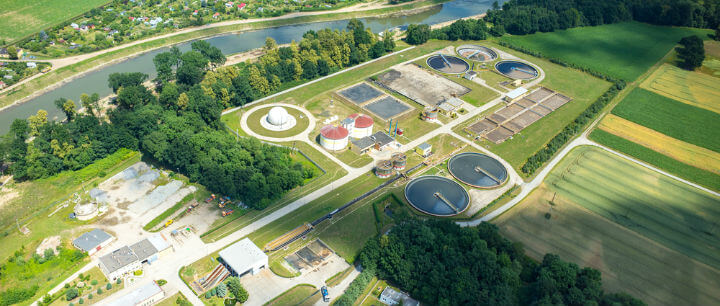How Much Energy Does a Wastewater Treatment Plant Use?
Written by AOS Treatment Solutions on March 1, 2018

Wastewater treatment energy consumption varies considerably throughout the country. There are several reasons for this, including variations in climate, equipment efficiency, types of pollutants, and specific energy practices. There are many benefits of limiting energy use and ways you can reduce your energy consumption.
Level of Power Consumption
It’s important that your facility is accountable for its water treatment energy consumption. Preliminary treatment, sedimentation, chlorination, and processing sludge are some of the processes that each takes different amounts of power. There are also other miscellaneous uses of energy to consider, such as light usage.
Energy Star reports that energy usage can range from over 50k BTU/gallon each day to less than 5. Energy consumption of wastewater treatment plants is often determined by the type of pollutants in the water, how much of these pollutants are present, and the methods used to remove them. For example, trickle filtration will normally use less energy, while nutrient removal will use higher amounts of energy. Nutrient removal, however, is often a necessary process.
Benefits of Reducing Water Treatment Plant Energy Consumption
According to the Environmental Protection Agency (EPA), there are several benefits of reducing energy consumption in a wastewater treatment plant.
- Increased Life of Equipment and Infrastructure – By installing more energy efficient methods, energy consumption can be reduced and therefore extend the life of the equipment. The need for maintenance will be limited as well.
- Reduced Pollution and Emissions – Energy reduction can reduce GHG emissions and limit the amount of air pollution that your facility creates. The release of pollutants can be limited by reducing the use of fossil fuels.
- Reduced Energy Costs – Wastewater facilities use a significant portion of a community’s energy resources. Overall costs can be reduced when your facility runs more efficiently and uses less energy.
- Improved Security – Greater energy efficiency can also help prevent blackouts and brownouts by limiting the electrical demand in a community. It can also reduce the potential for a water shortage.
- Improved Public Health – Limiting energy consumption can reduce levels of water and air pollution. Increasing overall efficiency can also reduce the risk of water-related illnesses.
How to Reduce Wastewater Energy Consumption
The National Renewable Energy Laboratory (NREL) states that there are several ways to reduce the amount of energy consumption in your facility.
- Conduct an Energy Audit – The first step toward reducing energy use is to do an audit to find out exactly what the energy expenditures are for your plant.
- Create a Plan – It’s important to create an industrial water treatment plan that is unique to your specific facility. After identifying objectives, it is time to put together an action plan that will need the approval of management and the implementation of training programs. The following are several steps the plan could include:
- Install New Equipment – Older equipment is more expensive to repair and usually doesn’t operate as efficiently as newer models. It’s essential to have the most energy-efficient equipment possible and to keep up a schedule of preventative maintenance.
- Improve Pump Optimization – Pumping processes normally use a lot of energy and provide opportunities for savings. It’s important to know which blowers or pumps to use, and how often to use them when conserving energy.
- Implement Renewable Energy – Employing sources of on-site renewable energy is an excellent way to save on energy consumption while protecting the environment. Solar, water, and wind are potential options.
- Monitor and Maintain Improvements – You’ll need to evaluate what’s working and what’s not on a regular basis, making improvements where needed.
Industrial wastewater treatment services can assist you in making your facility as energy efficient as possible. AOS Treatment Solutions has been providing detailed treatment programs for municipal water treatment facilities since 1999. Contact AOS for more information regarding how you can reduce the amount of energy your plant uses.

